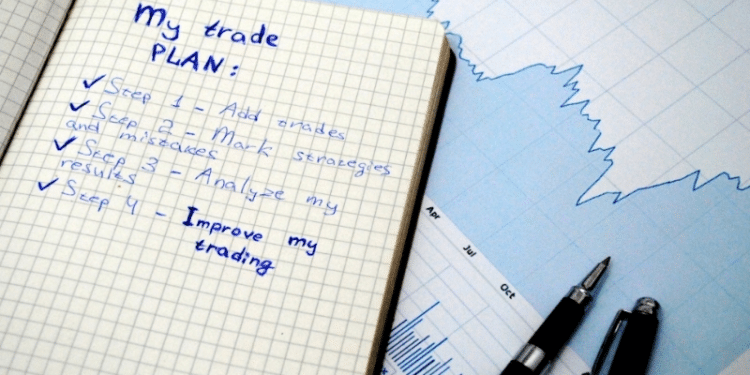One of the famous quotes of Benjamin Franklin was, “If you fail to plan, then you are planning to fail.” The thing holds its worth when it comes to trading the financial markets. In an industry where most traders can not make it in the top 10%, you must plan any position or trade before executing it. All the big traders in the financial institutions and the banks confirm the importance of a trading plan.
Your master plan for trading lays out all the essential rules you must adhere to while you are in the markets. It may or may not differ from other traders as each person has their own sets of goals and objectives to follow. Our article will shed a brief light on the benefits of a trading plan and guide you on how you can build a perfect one.
Why do you need a trading plan?
A training plan can help you make the right decisions based on logic. Following key benefits can be realized of using a pre-prepared scheme:
- It will help keep your emotions such as fear and greed under control.
- You will have a clear guide as your game plan will act as a map directing you on your trading decisions.
- It can help you become a consistent trader much faster.
- You can eliminate the noise from the market.
- It will be harder for you to break the rules with a written set of plans as you know it is not the right thing.
- A few occasional losses will not get you worked up as the trading plan will remind you that your strategy works in the long run.
- A pre-written set of rules for your trading will surely increase your performance by a considerable margin.
Creating a trading plan
Developing a trading plan may seem like a tedious task; however, keep in mind that doing so will help you stay away from margin calls and other benefits mentioned before. It consists of a few steps which are not complicated:
- Assessing your motivation and skills.
- Preparing yourself mentally.
- Defining what your goals are
- Setting up risk management.
- Testing your knowledge and preparing yourself.
- Exit/entry rules.
- Journaling your trades.
Assessing your motivation and skills
You have to commit a lot of time and effort if you think you will make it to the top. Assessing your skills is also essential, which can be done by a trading demo account. The market is ready to take away from your money if you don’t have a plan beforehand.
Preparing yourself mentally
Trading is 80% psychology, 15% strategy, and 5% luck. Preparing yourself to trade the markets with the right mindset is essential to get profits. Always ask these questions before stepping to your desk each day:
- Am I mentally sound enough?
- Do I hold any grudges against the market?
- Do I have any fear of trading? And so on.
If the answer to any one of the above is Yes, you need to check your emotions as trading in such conditions will always lead to loss and frustration.
What are your goals?
Defining your goals is one of the most critical components of building a trading plan. They can be anything, including your profit target risk-reward or your daily monthly and yearly targets. For example, you can set that I will increase my portfolio’s overall value by 20% for the current year.
Setting risk management
Professionals always decide on the amount of risk they are willing to put on a trade before entering the markets. The industry standard is 1 to 5% of your total equity, but it also depends upon your tolerance values and trading strategy.
It is better to take a walk if you exceed your overall daily drawdown margin. Overtrading is one of the major killers of traders who are at an amateur level. Live to fight another day.
Test your knowledge and prepare yourself
Our trading plan made especially for the forex market will differ from the one made for stocks. The kind of asset that you trade should have its own game plot.
Analyzing your knowledge about the industry and learning as much as possible will answer the kind of market they should choose for trading. Volatility, liquidity timeframes, spread, number of assets, etc., are a few factors to consider.
Exit/entry rules
Entering a position is only short of a button click, but the central point is where you plan to exit if the trade goes with or against you. Novices pay their attention to placing new executions. The problem comes when they are in a drawdown, and they do not want to close, fearing a loss. Remember that accepting losses is a part of the trading journey, and writing an accurate set of entry/exit rules is the best way to get healthy gains.
Journaling your trades
In the end, you should journal your trades as it is one of the best ways to analyze your performance and the future outlook of your trading portfolio. Take a note of all the positions you took during that day and record your emotions and decisions.
If you feel it is too stressful, you can also choose automatic trading journals; however, keep in mind that owning a manual copy has a significant advantage.
The bottom line
Trading is a game of probabilities where nothing is said to be 100% guaranteed. Make sure that you take the markets as some business rather than a play toy. Successful outcomes are only possible by following a predefined set of systems that control your risk management, strategy, and thought processes.




